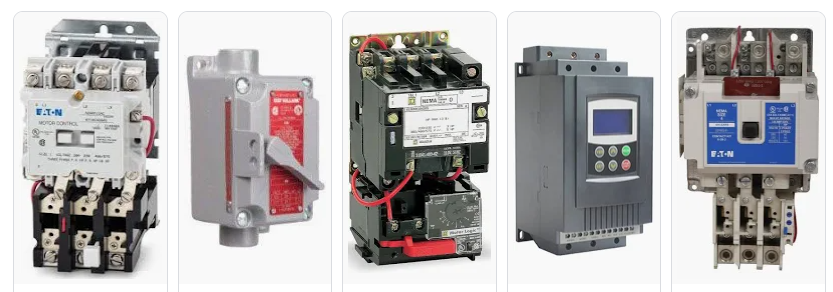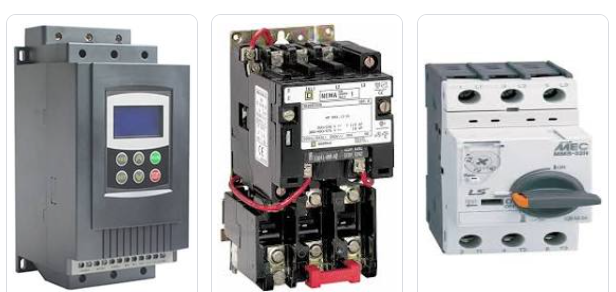Have you ever wondered what drives the massive industrial machinery to roar to life? You’re in the right place. Now, let’s explore the topic of selecting electric motor starters — devices that get the party started. We’ll examine six different kinds of electric motor starters and their functions.
So, what is a motor starter used for? Think of it like a motorcycle that you are trying to start. You engage the clutch and push forward to start the engine. When it comes to industrial motors and machines, a motor starter functions similarly to that helpful kick. Electric motors are triggered with electric motor starters, giving a steady and seamless acceleration.
Need Starters for Your Project?
Get QuoteSell To Us
Got Electrical Equipment You Don't Need?

Reduce Your Electrical Inventories & Earn Cash
Sell My EquipmentPanelboard
Need a Panelboard for Your Project/Job?

Our Experienced Sales Engineers Can Help Design the Right Panelboard For You
Learn MoreTransformer Oil Testing
Is Your Transformer Due For Servicing?

Get Your Oil Analysis & Fluid Testing Done By Our NETA-Certified Techs
Learn MoreElectrical Product Resources
Product Training Product Safety Product Guides Product News Featured ProductsSelecting the Right Type of Motor Starter
Selecting electric motor starters for your job will increase efficiency and safety when running your electric motors. Each device listed below has special features for intended applications. Here are six tips to help you choose the right device for controlling the starting and stopping of your motor:
Direct-On-Line (DOL) Starters
Application: Best for Small to Medium Motors
DOL starters are perfect for small to medium-sized motors since they offer full voltage at startup. DOL starters are affordable if you’re working with applications (like small machines) where a high starting current is acceptable.
Star-Delta Starters
Application: Ideal for Large Motors
When dealing with large motors, consider star-delta starters. They initiate the motor in a star configuration, reducing the starting current. As the motor speeds, it seamlessly switches to full voltage in a delta configuration, preventing voltage dips.

Autotransformer Starters
Application: Perfect for Medium-Sized Motors
Autotransformer starters are the best option if you’re working with medium-sized motors and wish to reduce the amount of beginning current. They ensure a seamless transition for your equipment by using an autotransformer to reduce the voltage during starting.
Variable Frequency Drives (VFD)
Application: Tailor Motor Speed to Your Needs
Variable frequency drives are better for applications needing variable speed control, like conveyor systems, fans, or pumps (VFD). These starters offer fine control over motor speed and energy efficiency by varying the voltage and frequency.
Soft Starters
Application: Ensure Smooth Acceleration
Soft starter design focuses on applications needing gradual acceleration and less wear on mechanical components. These starters are the best option if your equipment needs a gentle start to avoid sudden shocks.
Electronic Motor Starters
Application: Modernize with Advanced Control Systems
Electronic motor starters are the newest thing in motor control technology. With features like gentle starting and overload protection, these starters employ electronic components for precise control. Ideal for sophisticated, contemporary motor control systems.
Knowing the features of each kind and selecting electric motor starters for your motor controls is important for choosing the best motor starter. Whether energy efficiency, cost-effectiveness, or sophisticated control capabilities are your top priorities, these pointers will help you choose motor starters for your needs.
| Types of Electric Motor Starters | Description | Application |
| 1. Direct-On-Line (DOL) Starters | DOL starters provide full voltage to the motor terminals during startup. They are simple and cost-effective but may cause high starting current. | Suitable for small to medium-sized motors where high starting current is acceptable. |
| 2. Star-Delta Starters | In this starter, the motor initially starts in a star configuration (low voltage), and then switches to a delta configuration (full voltage) after a specific time. This reduces the starting current. | Ideal for large motors where high starting current may cause voltage dips. |
| 3. Autotransformer Starters | Autotransformer starters use an autotransformer to reduce the voltage during startup, minimizing the starting current. The voltage is then increased once the motor is running. | Suitable for medium-sized motors where a reduction in starting current is necessary. |
| 4. Soft Starters | Soft starters gradually increase the voltage and current to the motor, reducing mechanical stress and electrical disturbances during startup. | Ideal for applications requiring smooth acceleration and reduced wear on mechanical components. |
| 5. Variable Frequency Drives (VFD) | Can be used as starters. VFDs control the speed of the motor by varying frequency and voltage of power supplied. They provide precise control over motor speed and are energy-efficient. | Suitable for applications requiring variable speed control, such as pumps, fans, and conveyor systems. |
| 6. Electronic Motor Starters | These starters use electronic components to control the motor’s startup and operation, providing features like overload protection and soft starting. | Commonly used in modern and advanced motor control systems. |
7 Commercial and Industrial Electric Motor Starter Applications
Motor Starters for Conveyor Systems in Industrial Machinery: Motor starters give smooth and controlled operation of conveyor belts, preventing sudden starts and stops and reducing wear and tear. Plus, optimized overall efficiency in material handling.
Motor Starters for HVAC Systems in Air Conditioning Units: Motor starters regulate the operation of compressors in air conditioners, providing energy-efficient and exact control over cooling cycles. This enhances comfort and extends the lifespan of the HVAC system.
Motor Starters for Water Pumps in Water Treatment Plants: Motor starters manage the pumps in water treatment plants, giving a reliable and consistent water flow for purification processes. Plus, it has optimized resource utilization and standardized water quality.

Motor Starters for Crushers in the Mining Industry: Electric motor starters in crushers control powerful motors, improving safety and efficiency by preventing overloads and abrupt starts. It also improved the reliability of mining operations and minimal downtime.
Motor Starters for Drilling Equipment in the Oil and Gas Industry: Motor starters have a crucial role in drilling equipment, delivering precise control over motors and improved operational safety. This also supports smooth and reliable drilling processes in the rugged environments of the oil and gas industry.
Motor Starters for Elevators in Commercial Buildings: Motor starters manage motors in elevators, delivering smooth acceleration and deceleration and reduced energy consumption. You also get a safe and comfortable ride for occupants in commercial buildings.
Motor Starters for Refrigerators in Commercial Food Service: Motor starters control compressor motors in refrigerators for consistent cooling cycles, optimizing energy efficiency and extending the appliance’s lifespan. This maintains a stable temperature for food preservation in commercial settings.
What You Should Know About Motor Starters
This post on selecting electric motor starters has covered many varieties and uses for these indispensable gadgets. We explored the roles played by various starters. When choosing the appropriate device to regulate the starting and stopping of motors, it’s essential to know the differences among starters. Considerations like the scale of the application and the requirement for steady acceleration were among the important insights covered.
We reviewed some uses of electric motor starters in commercial and industrial situations, from elevators in commercial buildings to conveyor systems in industrial machines. The correct motor starter improves efficiency, dependability, and safety in various operating situations. Whether you’re managing water treatment plants or improving HVAC systems, this knowledge can help you achieve better motor control.
With this information, you can better analyze and solve starter-related motor issues in your electrical system. At Relectric, we supply motor starters and other electrical parts to help you with your projects. We’re here to help! 800.497.6255
